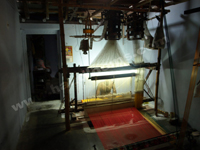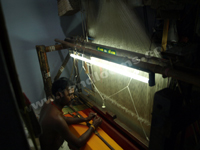Handloom industry
The village is once well known for handloom silk products. Once famous for its handloom products now

flourishing with power looms. The

traditional weavers are very much upset due to the decline of handlooms. Rasipuram is famous for its silk handloom products. Rasipuram handlooms are well known for the durability of the colours used in the yarn. The mixture of colour gives the durability. The count used in weaving gives the softness and hardness of the fabric. Count means the number of threads used in the length and breadth for weaving known as warp and weft respectively. In Rasipuram 5600 threads are used in warp. The width of the saree comes to 51 inches. Each and every thread of the Rasipuram handloom saree is hand woven. Each weaver works from home with all his / her family members helping in different steps of the process. It requires approximately 4-8 days (depending on the variety of saree) of continuous efforts for weaving a saree.
Dyeing
The process of manufacturing a Rasipuram handloom Saree starts with dyeing the silk yarn. Dyeing is the coloring process of the yarn by dipping the yarn in the boiled color water in very high temperature, higher the temperature durability of colour is also higher. Dyeing of the yarn is done making sure that the color is spread uniformly throughout the yarn and it does not affect the quality of the yarn. The coloring process is a very crucial step in getting a good colourful saree. The colours are applied as per the specifications of the designers and also some times as per the orders from customers who orders for a designer Saree. After coloring the silk yarn is dried in shade. Drying yarn in sun can be harmful to yarn.
Weaving
After dyeing and drying the yarn it is converted to thread and is loaded as warp which is called pavvu and then it is loaded into the loom for actual weaving. It is also rolled over small sticks to use for wept. One pavvu will make 6 sarees. It will take 2 months to complete weaving of one pavvu. The weaver will get a remuneration of around
` 700 per saree. Rasipuram handloom sarees are traditionally woven in the interlocked-weft technique.
Design
The design required on the saree is initially drawn in a computer and then this is punched into a card and then these cards are loaded in Jacard in the loom. Jacard is a box like structure which is fixed in the top of the loom. There will be needles in the Jacard which will read the punched cards and control the weaving of weft.
Declining Handloom industry
Weaver’s voice

